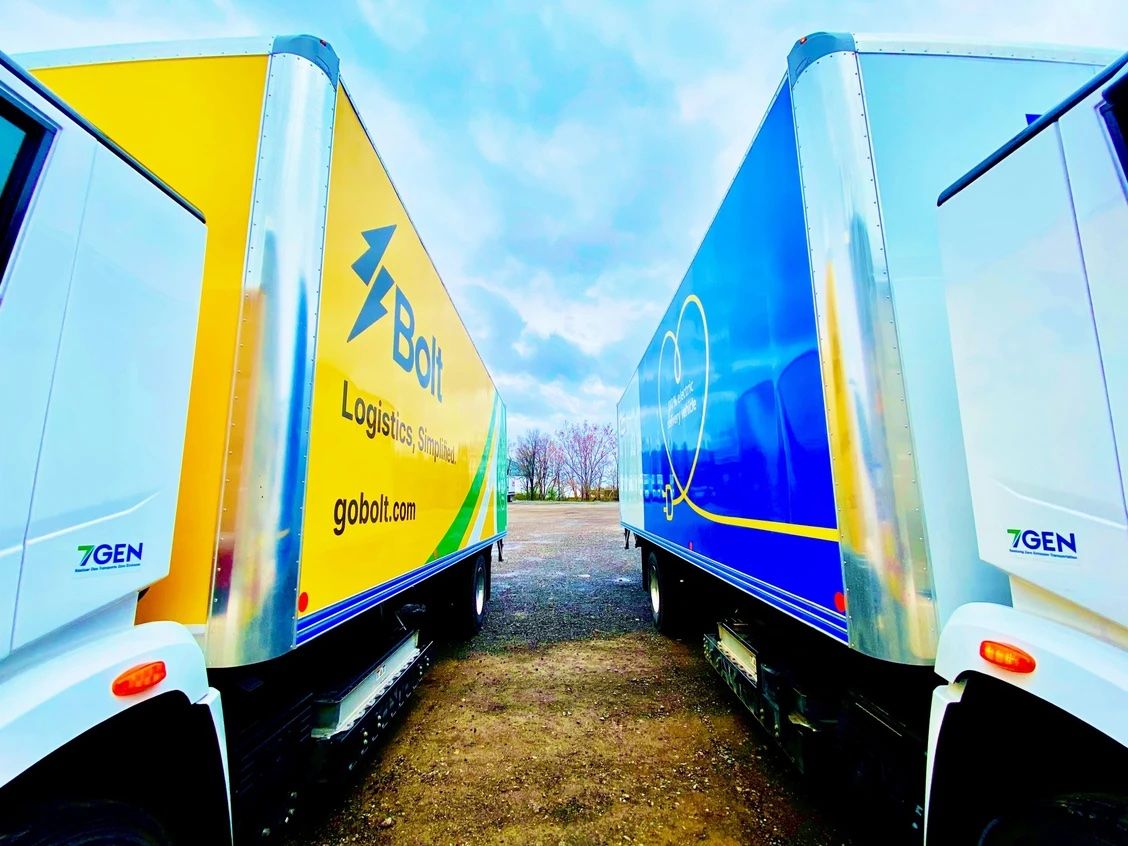Shayna Rector-Bleeker didn't plan to be an entrepreneur. But as the pandemic took hold, she saw an opportunity emerge in the intersection between changing consumer habits and growing interest in climate action. And found herself taking on the challenge to bust through the barriers to commercial fleet electrification. Three years later, she looks back on what she and her collaborators have learned.
It all started with a small project to help a Vancouver tour bus operator electrify its fleet of 70 buses. Shayna and her colleagues worked with them to figure out the technology, the infrastructure locations on public lands, and potential financing. Then the pandemic hit, tourism ground to a halt, and the project was shelved.
That was it, she figured. Or was it? Shortly after that, she met the Canadian Head of Sustainability for Ikea who told her about their impressive commitment to go net zero by 2025 – right down to the last mile of delivery. That's when it really hit her and her colleague Frans Tjallingii that this need was so much bigger than one tour bus operator. Many fleets would need a partner to help mobilize the money, and the know-how to deploy this ‘new’ technology and infrastructure, with as yet unknown residual values.
Shayna's business partner Frans immediately recognized that there was a business opportunity here – to help medium and heavy-duty fleet owners get into electric vehicles. But Shayna wasn't ready to go all in as an entrepreneur yet.
Perspective and readiness matter
She was still catching her breath after a decade of working from Shell on energy issues as an advertising exec and was now dealing with the pandemic and what that meant at home.
"I cared so much that I really was giving it my all. And a lot of people that work in high-stakes environments – be it related to health or the environment and climate change – every minute, every day counts. And that can be really tiring. I just did not want to found a business in March of 2020. I was homeschooling my kids, and taking care of aging parents. So it was just an acknowledgement. I needed a little bit of perspective and time. I needed to step away before I could step in again."
Plus, like many talented leaders, she felt that the problem of climate change was so big and overwhelming that she needed more time to figure out which specific piece she should tackle.
Frans left the invitation to collaborate open, and dove into the work of starting a business, including choosing the name 7Gen as a tribute to First Nations worldview that considers the interconnections of air, land, water and animals, calling on us to learn from previous generations and meet current needs without affecting the ability of future generations to meet their own.
Time to act
But as the pandemic unfolded, Shayna realized that the climate impacts of local shipping were rapidly becoming much worse, as consumers started to order everything to be delivered to their doors. Though she never planned to become an entrepreneur, she knew she had to act and joined Frans as the co-founder and VP of 7Gen.
"I just thought, 'Oh my goodness, this is the decade of action. We've got stuff we gotta do between now and 2030.' Lots of companies had started to establish net zero goals, science-based targets. You know, science we've known for 20 years, but we're now putting it into company policy. It was becoming a thing. And I thought, 'You've got to use your network and your know-how to contribute in some way. Shayna.'
The timing was great. Ikea was seeing positive responses to their electrification targets in Europe and Asia. Fuel costs were rising. And cities were starting to establish zero-emission zones.
Finding the money
But there would be major hurdles to overcome. They knew from earlier experiences that electrifying a fleet went far beyond "just" choosing a different technology and finding the money to pay for it. So they built an integrated model to make the process easier.
"We help clients in the technology selection. And then we design, build, install the charging infrastructure that they will need, and then we lease both those chargers and vehicles back to them."
For many operators, that last piece can be the most critical. Despite broad market commitments to decarbonization, financing an electric fleet can be tough. The new technologies are still expensive. And margins in the transportation industry are slim. Plus, lenders don't know how long these vehicles will last or what the risks are with them, so they're reluctant to finance new electric vehicles.
Rather than leaving their clients to figure it out on their own, Shayna and her partners looked to recent advances in social finance to find new ways to pay for this transformation.
"Without us helping them, they'd have to come up with a lot of money that they don't have sitting there – money that they'd otherwise use to hire people and grow their business. Because some clients are actually quite young transportation companies. And they are winning business off of the traditional transportation providers that have been around 50, 60, 100 years, because they're willing to say their growth story is a zero emissions growth story. And the other guys who are saying, 'It's too expensive, it's too hard, it's not yet,' are losing market share to these companies that are going, 'I'm all in.'
To make this work, we're trying to spread it over a number of years to amortize the cost of the vehicles and the infrastructure. And at the end of the day, that has our clients doling out a similar amount of money per month as they may be doing now on the combination of fuel maintenance, oil, tune-ups, all that jazz."
Tackling operational challenges
7Gen is also developing systems to help bigger organizations figure out how to manage their new electric fleets, as the change in technologies from combustion to electric has implications for the way they operate.
"It's not as simple as going down to a dealer and going, 'I want a truck and I'm gonna get a gas card'. It is a different technology. You need to consider different things around how much you can haul because you've got now heavy batteries in these vehicles. Maybe that impacts how much load you're even able to put onto it. Your drivers have to drive differently. It's a lot of complexity. In fact, we've built a bit of a software layer over top of it so that they can see, across different platforms and manufacturers how their vehicles are performing."
Guiding clients through the electrification process is a big part of 7Gen's value proposition.
"The way I sometimes say it to fleet managers is, 'You know, don't get daunted by this. We've done this before. A hundred years ago, we had a lot of horse and buggies going around. Then this thing called the Model T Ford showed up. And people thought this was going to be fringe, you know, I'm used to figuring where's the pub and where's the place to feed my horse? Within a decade, the majority of transportation had shifted over and this incredible new infrastructure – gas stations and all of these things – had come to be that seemed impossible at the beginning. Yet it happened, and this is what we're doing again now.'"
Looking back, Shayna recognizes that building an affordable working system for fleet electrification has been much more difficult than they expected.
"We knew it was complex. But we thought, 'Maybe if we can just mobilize the money and show people how to pay for it, it'll happen.' Well, no. There's a lot of decision-making and choices of technologies that many fleets are not doing on their own. Some just don't have the time or the capacity in-house."
Despite all the challenges, it is happening and they're getting their first 100 vehicles on the road.
Finding ways to grow
In the summer of 2022, they accepted their first Series A funding. Now they're working on delivering projects and building towards a Series B raise.
Looking ahead, they're also focused on new challenges – starting with getting a larger debt financing facility, instead of negotiating deal by deal. They're also working on vehicle availability. Like every industry, the supply chain is a challenge. And even though availability is going up, other markets like Europe, the US and China are ahead of Canada and it's tough to get new electric vehicles delivered here instead.
Partnerships are everything
What's the secret to their success so far? Learning from the past. And developing partnerships - Shayna's superpower.
"We didn't do this alone. We've assembled a team that brings skills from different parts of the equation. So I often say that I'm the least technical member of the team. But I have a lot of experience in bridging systems, doing government relations, framing up partnership arrangements with people that haven't worked together before. That's my jam – what I've done most of my career. Other folks on the team are electrical engineers that have worked on designing and installing these systems. Others are familiar with drivetrain technology, both internal combustion engine and electric. And then a significant part of our team is very smart at understanding project finance and the various sources we can go to, to basically create a total capital stack that says, 'We'll take on the risk of this equation'. And no one of those actors is ready to do it on their own. Utilities aren't ready to do it on their own. Someone that's manufacturing these vehicles, they make vehicles and they want to sell vehicles. But they don't want to get into designing and installing all of your infrastructure. It's a lot of different puzzle pieces. And if a fleet manager has to deal with every single separate company and every single separate charger and every single separate utility, they're going to have to clone themselves four times over. There are not enough hours in the day."
What's one thing she would change in hindsight? Adding a buffer for more time and patience. Everything takes longer than expected. And because this is all new, it's often more complex than they imagined.
"Fleet electrification right now is complex and I wish ... I can't even wish. We're just, we're in it. We're innovating. And the thing with complex challenges is that it is emergent. You probe, you try, you sense and you respond. 'Okay, what worked? Do that again. What didn't work? How do we adjust?' That's where the market is right now. So ask me again in a year and I will have so much more to answer on that."
The power of purpose
But there is one thing that's not a problem. Motivation.
"I discovered the roots of balance in that pause I took when I left Shell. To do sustainability work, you need to take care of yourself, put your own oxygen mask on, and then march forward and do the work you need to do. Now, I'm truly energized. When you're doing something that matters, you get yourself out of bed every day and you find a new way to lean in. I have big gratitude for the team we've assembled around this work to date. There's a doggedness, a commitment to the mission. Everyone that comes to this work, either in our team or as partners that are investors or clients, we're all here saying, 'This technology exists – we gotta get it deployed faster.' So when you have those hard days, the setbacks, you get up the next day and you find a new path together."
That really is the call to action for all of us. As Shayna says, we need to stop moving deckchairs around in our organization (as they did on the Titanic) and just get started.
"Rather than sitting back and being daunted by all the things that need to be done, it sure is fun to roll up your sleeves and try. You know, this kind of change often happens at the edge of organizations or systems and it has you working with other people and other companies and sometimes in new ways. And it seems hard, but it's fun. Learn by doing. And even if you scuff your knees and get hurt along the way, you will move. You will learn. And that learning will inform the next attempts. And hopefully, they'll have some legacy. And those future generations will thank you. 'All right. They didn't wait another 15 years to do that thing that needed to be done.' So get going."
Listen to our full conversation, and learn more about 7Gen.





